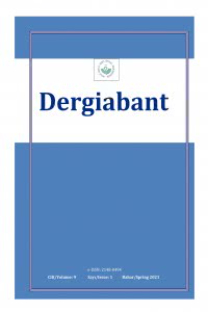İslamî yahut Seküler Tarih: Tarif Khalidi ve Thomas Bauer’in Müslüman Tarih Yazımı Kategorilerinin Yeniden Değerlendirilmesi
Uzun süredir tedavüldeki kavramlara yönelik meydan okumaların giderek kabul görmesi, birçok yeni düşüncelerin ortaya çıkmasına neden olmuş ve İslâmî ilim geleneğine yeniden erişmenin yolunu açmıştır. Bu özellikle İslâmî ve seküler kategorileri söz konusu olduğunda geçerlidir. Bu makale, Filistin kökenli tarihçi Tarif Khalidi ile Arap dili ve edebiyatı konusunda uzmanlaşmış Alman bilim adamı olan Thomas Bauer'in çalışmalarına odaklanmakta ve üç hedefi bulunmaktadır. Birincisi, “kültürel müphemlik” kavramını teşekkül dönemine uygulamak ve bunun aşamalarını izlemek. İkincisi, tarihe seküler tarzda yaklaşımın nasıl ve ne zaman norm haline geldiğini göstermek. Üçüncüsü de, Müslüman alimlerin, farklı ilimlere ait konuların bir şekilde vahiyle temas kurduğu şer‘î alanı nasıl sınırlandırdıklarını göstermek. Bu kendi kendini sınırlama, akıl ve ampirik bilgiye yaslanan epistemolojilerle farklı söylemlere de bir alan açmıştır. Tarih çok erken dönemlerden itibaren seküler bilimlerin bu şer‘î olmayan alanı içine konumlandırılmıştır.
Islamic or Secular History: Reassessing the Categories of Muslim Historical Writing by Tarif Khalidi and Thomas Bauer
The growing acceptance to challenge long-held notions have led to many new insights and opened up ways to access the Islamic scholarly tradition anew. This applies especially when it comes to the categories of Islamic and Secular. The present paper focuses on the works by Tarif Khalidi, a historian of Palestinian origin, and Thomas Bauer, a German scholar specializing in Arabic language and literature, and tries to achieve three objectives. First, applying the concept of cultural ambiguity to the formative period and observing it in its formative stages. Second, showing how and when a secular approach to history became the norm. Third, demonstrating how Muslim scholars demarcated a sharʿī realm in which the subject matters of the different sciences were in one way or another dealing with the revelation. This self-imposed boundary opened up a space for other discourses with their epistemologies based on reason and empirical knowledge. From a very early stage, history was to be found in this non-sharʿī realm of secular sciences.
Keywords:
Islamic, Secular, History Cultural Ambiguity, Western Discourse,
___
Al-Duri, Abd al-Aziz. The Rise of Historical Writing Among the Arabs. Princeton: Princeton University Press, 1983.Bauer, Thomas. “Religion und Klassische-Arabische Literatur”. Poetry's Voice - Society's Norms.eds. eds. A. Pflitsch and B. Winckle.13-29. Wiesbaden: Reichert Verlag, 2006.
Bauer, Bauer. Die Kultur der Ambiguität: Eine andere Geschichte des Islams. Berlin: Verlag der Welt Religionen, 2011.
Bauer, Thomas. Die Vereindeutigung der Welt. Leipzig: Reclam Verlag, 2018.
Bauer, Thomas. Warum es kein islamisches Mittelalter gab. München: C.H. Beck Verlag, 2019.
Bakker, Jens. Normative Grundstrukturen der Theologie des sunnitischen Islam im 12./18. Jahrhundert. Bonn: EB-Verlag, 2012.
Bosworth, See C. E. “Nasīhat Al-Mulūk”. The Encyclopaedia of Islam. New Edition. ed. C. E. Bosworth et al. 7/984- 988. Leiden: Brill, 1993.
Ibn Khaldūn, The Muqaddima. trans. Franz Rosenthal. Princeton: Princeton University Press, 2015.
Jackson, Sherman A. “The Islamic Secular”. The American Journal of Islamic Social Sciences, 34/2 (2017), 1-38. al-Ghazālī, Abū Ḥāmid. al-Munqidh min al-Ḍalāl. Beirut: Dār al-Andalus, nd.
Von Heidemann, Stefan (eds.), et al. Der Islam. 91/1 (Berlin: De Gruyter, 2014), 1-160.
Hodgson, Marshall. The Venture of Islam. 3 vols. Chicago: University of Chicago Press, 1975.
Khalidi, Tarif. Islamic Historiography: The Histories of Mas’ūdī. New York: State University of New York Press, 1975.
Khalidi, Tarif. Arabic Historical Thought in the Classical Period. Cambridge: Cambridge University Press, 1994.
Khalidi, Tarif. Images of Muhammad: Narratives of the Prophet in Islam Across the Centuries. New York: Crown Publishing Group, 2009.
Khalidi, Tarif. “The Books in My Life: A Memoir (Part 2)”. Jerusalem Quarterly, 74 (Summer, 2018), 30-47.
Khalidi, Tarif. “Islam and Literature", YouTube. Release Date 15.05.2015. https://www.youtube.com/watch?v=WGQfB7vtr5I.
Koren, Judith – Nevo, Yehuda D. “Methodological Approaches to Islamic Studies”. Der Islam, 68 (1991), 87-125.
Marlow, Louise. Counsel for Kings: Wisdom and Politics in Tenth-Century Iran. Edinburgh: Edinburgh University Press, 2017.
Pollan, Michael. The Omnivore’s Dilemma: A Natural History of Four Meals. New York: Penguin, 2006.
Rosenthal, Franz. A History of Muslim Historiography. Leiden: Brill, 1968.
Rosenthal, Franz. Technique and Approach of Muslim Scholarship. Rome: Pontificium Institutum Biblicum, 1947.
Sezgin, Fuat. Geschichte des Arabischen Schrifttums. 17 vols. Leiden: Brill, 1967-2015.
al-Ṭabarī, Ibn Jarīr. Tārīkh al-umam wa al-mulūk. 6 vols. Beirut: Dār Ibn Ḥazm, 2014.
Treiger, Alexander. “Al-Ghazālī’s Classifications of the Sciences and Descriptions of the Highest Theoretical Science”, Dîvân Disiplinlerarası Çalışmalar Dergisi. 16/30 (Istanbul, 2011), 1-32.
Voll, John O. “Islam as a Special World-System”. Journal of World History, 5/2 (1994), 213-226.
- Yayın Aralığı: Yılda 2 Sayı
- Yayıncı: Abant İzzet Baysal Üniversitesi
Sayıdaki Diğer Makaleler
İbnü’s-Sükkerî ve Nafile Namazlarda Kıraate Dair Risalesi
1723-1724 Yıllarında Konya’da Hibe’nin Panoraması: Hak mı, Haksızlık mı?
Mülhidlikle Suçlanan Bir Şairin Şeyhülislâm Çivizâde’ye Nefsin Mertebelerine Dair Bir Mektubu
Suudi Arabistan Romanlarında Anlatım Tekniği Olarak Diyalog ve İç Monolog
Âşûrâ Orucunun Kökeni ve Fıkhi Hükmünün Tahkiki
Kur’an’ın Anlamlarının Türkçeye Aktarımı: Meâl mi Tercüme mi?
